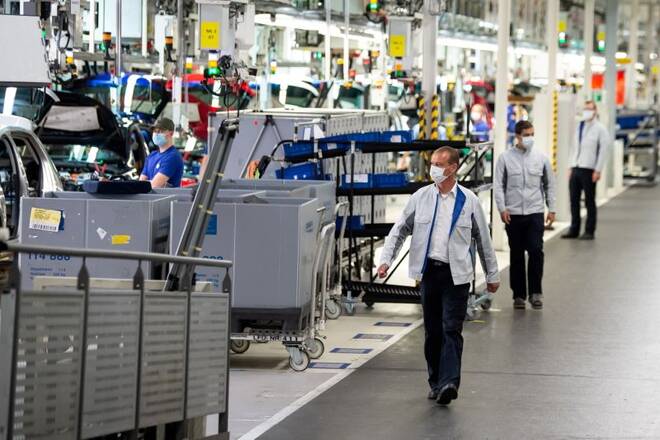Advertisement
Advertisement
Euro zone factory growth picked up in Nov but inflationary pressures mounted
By:
LONDON (Reuters) - Manufacturing growth in the euro zone accelerated slightly last month but supply chain bottlenecks worsened, putting a cap on output and driving the cost of raw materials up at the fastest rate in over two decades, a survey showed.
LONDON (Reuters) – Manufacturing growth in the euro zone accelerated slightly last month but supply chain bottlenecks worsened, putting a cap on output and driving the cost of raw materials up at the fastest rate in over two decades, a survey showed.
Disruptions caused by the coronavirus pandemic, alongside a shortage of heavy goods vehicle drivers, has led to product shortages and left factories struggling to get the materials they need to manufacture goods.
IHS Markit’s final manufacturing Purchasing Managers’ Index (PMI) nevertheless nudged up to 58.4 in November from October’s 58.3, shy of an initial 58.6 “flash” estimate but still comfortably above the 50 mark separating growth from contraction.
An index measuring output, which feeds into a composite PMI due on Friday and seen as a good guide to economic health, rose to 53.8 from October’s 53.3.
“A strong headline PMI reading masks just how tough business conditions are for manufacturers at the moment. Although demand remains strong, as witnessed by a further solid improvement in new order inflows, supply chains continue to deteriorate at a worrying rate,” said Chris Williamson, chief business economist at IHS Markit.
Those disruptions have made it a sellers’ market for raw materials and the input prices index was only just below October’s record high.
But factories passed on more of those rising costs to customers and increased their prices at the fastest pace since IHS Markit began collecting the data 19 years ago. The output prices index climbed to a survey high of 73.7 from 72.6.
That suggests overall inflation in the bloc, which preliminary official data showed on Tuesday was a record high 4.9% last month, will continue to overshoot the European Central Bank’s 2.0% target.
Elevated inflation and a surge in house prices has put pressure on the ECB, which has undershot its inflation target for nearly a decade, to act.
The ECB is forecast to keep its key interest rates on hold through to end-2023 at least, a November Reuters poll found.
(Reporting by Jonathan Cable; Editing by Catherine Evans)
About the Author
Reuterscontributor
Reuters, the news and media division of Thomson Reuters, is the world’s largest international multimedia news provider reaching more than one billion people every day. Reuters provides trusted business, financial, national, and international news to professionals via Thomson Reuters desktops, the world's media organizations, and directly to consumers at Reuters.com and via Reuters TV. Learn more about Thomson Reuters products:
Advertisement
